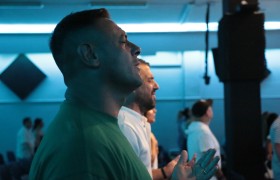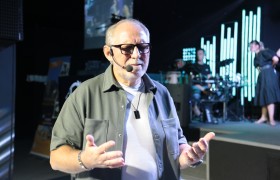Faith in the Covenant
PREACHING OF AUGUST 18, 2024:
Pastor Antonio Russo
FAITH IN THE COVENANT
In this worship service, we will delve into faith in the Covenant because in these last times, God is raising up a new generation destined to receive a powerful revelation. Surely there will be a great change because when we understand the meaning of the Covenant, it is not because we deserve it, but because God, in His mercy and great love, has chosen to grant it to us. Let us begin by reading a Scripture.
Psalm 25:14; 14 The secret of the Lord is with them that fear him; and he will shew them his covenant.
In this text, secrets are discussed that God does not want to withhold but are revealed only to those who fear and honor Him. The revelation of the Covenant is not obtained simply by reading the Bible but requires prayer, study, and the involvement of the Holy Spirit. To fear God does not mean to be afraid but to respect Him and believe in His Word, and this attitude brings great benefits to our lives. Throughout history, God has revealed various covenants to His people, including at least eight mentioned in the Bible, as well as personal covenants, such as the one established with David. However, our Western mindset often prevents us from fully understanding the importance and effectiveness of a covenant, while Eastern and African cultures have a deeper understanding of this concept. Now, let's explore some biblical instructions, such as in Psalm 105, that help us understand the value of the covenant. God bases His relationship with us not on emotions but on the covenant, which establishes a legal connection with Him; therefore, understanding the covenant is fundamental for our spiritual life.
Ephesians 2:12; 12 That at that time ye were without Christ, being aliens from the commonwealth of Israel, and strangers from the covenants of promise, having no hope, and without God in the world:
The apostle Paul reminds us that before knowing Christ, we were strangers to the covenants and promises of God. As Gentiles, we had no legal right to approach God, unlike the people of Israel with whom God had established covenants. The eight covenants mentioned and described in the Old Testament come from Israel, and therefore, all divine blessings could reach the earth only through this chosen people of God, as highlighted in Psalm 105.
Psalm 105:8-11; 8 He hath remembered his covenant for ever, the word which he commanded to a thousand generations.
God is acutely aware of His eternal covenant, valid for a thousand generations, as stated in the Bible, which affirms that His Word is steadfast in the heavens. In the Old Testament, we find various covenants, but we refer to the eternal covenant, not the temporary ones like the Mosaic covenant, which had a beginning and an end. This Psalm prophesies about the eternal covenant that God made with Abraham, and the New Covenant, defined by Jesus as the "new and everlasting alliance", is connected to it and amplifies it, extending even to the Gentiles. In fact, God had already indicated to Abraham that all families on earth would be blessed through him, demonstrating that the covenant also extended to the Gentile people. The Bible teaches us that God divides the world into three main groups: the people of Israel (Hebrew), the Gentiles, who have no covenants or promises, and the Church of Jesus Christ, which, through Jesus' sacrifice and the covenant established with Abraham, is connected to the blessing that reaches all families on earth. Regardless of origin, anyone who believes in the coming of the Messiah enters into this covenant, which transcends Abraham's lineage.
Verse 9; 9 Which covenant he made with Abraham, and his oath unto Isaac;
God made a Covenant with Abraham and confirmed it with Isaac. The Bible reveals that God, having no one above Himself, swore by Himself, establishing covenants, promises, and oaths that will be fulfilled with absolute certainty, putting an end to any dispute. Through the Covenant, God offers us a stable and legal relationship with Him, and our faith becomes strong and secure when we understand and know this Covenant. God does not relate to us through emotions but through the Covenant He has revealed to us, to which we can appeal with the certainty that His promises will be fulfilled. This revelation of the Covenant is crucial for our future, and the new generation will have full awareness of it, living at a higher spiritual level. You see, unlike a few years ago when there was limited revealed spiritual knowledge, today the Holy Spirit is opening the Scriptures, allowing us to receive God's promises more deeply.
Verses 10-11; 10 And confirmed the same unto Jacob for a law, and to Israel for an everlasting covenant: 11 Saying, Unto thee will I give the land of Canaan, the lot of your inheritance:
So, God established the Covenant with Abraham, swore it with Isaac, and confirmed it with Jacob, recognizing him as Israel in his new relationship with God an eternal Covenant. This promise from God pertains to Israel and the land of Canaan, which was given as an inheritance to His people. Although we are now under the New Covenant, it doesn't mean we have to move to Israel; the land of Canaan remains the promise God made to Israel.
Psalm 105:37; 37 He brought them forth also with silver and gold: and there was not one feeble person among their tribes.
God made a Covenant with Abraham, which was sealed with a sacrifice and later confirmed, guaranteeing blessings and prosperity for his descendants. When God delivered His people from Egypt, He upheld the Covenant, leading the Israelites out with wealth and protecting them from diseases during the forty years in the desert; in fact, the Psalm read states that no one "stumbled". The word "stumbled" implies that no one was physically weak, like someone who stumbles. Illness, considered an intruder in the Hebrew mindset of the Covenant, found no place among them because God Himself had promised to heal them and keep every disease away. We, too, through Jesus Christ, are included in this Covenant, and we can claim God's promises, recognizing that illness should not be accepted as normal in our lives. God has called us to live in Covenant awareness, knowing that His will is our healing and blessing.
Psalm 103:3; 3 Who forgiveth all thine iniquities; who healeth all thy diseases;
David speaks with strength and revelation about the Covenant, anticipating the new and eternal alliance in Christ. Although he lived in the Old Testament era, David prophesied about divine grace and healing, demonstrating a deep understanding of God's Covenant. We must break free from Western mindset and embrace that of divine healing, rejecting illness as something foreign to our bodies, which are temples of the Holy Spirit. Just as Jesus healed all who believed, we must learn to see healing as God's will. David's declarations, such as 'He forgives all my iniquities and heals all my infirmities,' reflect a Covenant-based mindset. Israel won many battles relying on this Covenant mindset, which gave them the assurance of victory through their alliance with the Eternal.
1°Samuel 17:26; 26 And David spake to the men that stood by him, saying, What shall be done to the man that killeth this Philistine, and taketh away the reproach from Israel? for who is this uncircumcised Philistine, that he should defy the armies of the living God?
King Saul promised great rewards to anyone who would defeat the Philistine: exemption from taxes for their family, marriage to the king's daughter, and wealth. Aware of the Covenant with God, David did not see the Philistine as an invincible giant but as an uncircumcised outsider, therefore lacking legal rights before God. With confidence, David declared that he would cut off the Philistine's head. Similarly, we must face our difficulties, illnesses, pains, and poverty with the same mindset as David, remembering that we are children of God's Covenant and have a legal right to victory. Today, the revelation of God's Word continues to grow, and as children of God, we must manifest His power in our lives. Our words have power, and when we declare God's Word, demons flee. We are called to live with awareness of who we are and to whom we belong: children of God, heirs of the Covenant, with a promise of victory. Psalm 25 teaches us that God's secrets are revealed to those who fear Him, and when the veil is lifted, we can see reality as God sees it through revelation. In the Gospels, we find two people outside the Covenant who nevertheless received its blessings. The first is the centurion from Capernaum, who recognized Jesus as the Messiah and declared that His word alone could heal his servant. Despite being a Gentile, the centurion demonstrated an understanding of Jesus' spiritual authority, resulting in immediate healing for his servant. Jesus Himself marveled at this man's faith, noting that even the children of the Covenant in Israel had not shown such faith. The second person was the Syrophoenician woman, a Lebanese woman. Initially, Jesus did not respond to her, but she persisted, eventually prostrating herself at His feet in worship. Her worship caught Jesus' attention, and she asked Him to free her daughter from suffering. Jesus pointed out that she was not a child of the Covenant and that it wouldn't be right to take the children's bread, symbolizing healing, and give it to the little dogs. However, the woman responded with humility and faith, saying that even the little dogs eat the crumbs that fall from their masters' table. Impressed by her great faith, Jesus declared that He had not found such faith in Israel. This teaches us that God operates in His own way, and it is He who determines how healing is received. These examples show how revelation and faith in the Covenant can lead to receiving God's blessings, even when we appear to be outside the Covenant. Let's also remember General Naaman, who, thanks to a Hebrew servant, discovered that there was a prophet in Israel capable of curing him of leprosy. The servant noticed his blood-stained clothes and suggested seeking help from the prophet Elisha. Initially reluctant and convinced that the rivers of Syria were better, Naaman was persuaded by the servant, who pointed out that he would follow the instructions even if they were difficult. Finally, he accepted, immersed himself seven times in the Jordan River, and emerged with skin healed and healthy as that of a child. The centurion in Capernaum and the Syrophoenician woman received healing because they appealed to the Covenant and God's promise, while the children of the Covenant did not receive such blessings. In Luke 13, we read about a woman who suffered from ankylosing spondylitis for 18 years, a condition that prevented her from straightening up. When Jesus saw her, He called her to Himself and said, "Woman, you are set free from your infirmity", and immediately laid hands on her, causing her to stand upright. Despite the synagogue leader's indignation that the healing occurred on the Sabbath, Jesus explained that although there are six days for work, this woman, a daughter of Abraham and therefore of the Covenant, had finally received the liberation she deserved. Her healing happened because she was part of the Abrahamic Covenant and the promise of deliverance, revealing the power and mercy of God.


























